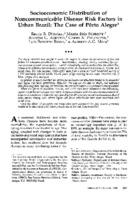Socioeconomic distribution of noncommunicable disease risk factors in urban Brazil: The case of Porto Alegre
Date
1993Author
Metadata
Show full item recordAbstract
The study reported here sought to assess the degree to which the prevalences of five risk factors for noncommunicable diseases- hypertension, smoking, obesity, sedentary lifestyle, and excessive alcohol consumption- varied individually and in combination for urban Brazilians with differing socioeconomic status in terms of educational achievement, income, and social class. For this purpose 1986-1987 data from a cross-sectional household survey of 1 157 randomly selected adults 15-64 years of age residing in the major Brazilian city of Porto Alegre were analized. In general, it was found that less privileged socioeconomic situations tended to be associated with higher risk factor prevalences. However, this was not the case for obesity and sedentary lifestyle among men, and may not have been the case with respect to hypertension among women. When the effects of education, income, and social class were considered simultaneously, higher risk factor prevalences were most strongly associated with low educational attainment. Important exceptions to this rule were found for smoking among women and excessive alcohol consumption among men, where higher risk factor prevalences were most associated with social class. Once the effects of education and social class were accounted for, income generally tended to be associated with lower prevalences of the risk factors studied
Subject
Collections
Related items
Showing items related by title, author, creator and subject.
-
Decelles, Stéphane; Nardocci, Milena; Mildon, Alison; Salameh, Bana; Batal, Malek (2022)[ABSTRACT]. Objective. To identify the determinants of exclusive breastfeeding (EBF) among children under 6 months of age from three regions in the South and Grand’Anse Departments of Haiti. Methods. Data were pooled from ...
-
Mol, Marcos Paulo Gomes; Queiroz, Josiane T. Matos; Gomes, Júlia; Heller, Léo (2020)[RESUMO]. Objetivo. Verificar a existência de associação de indicadores de gestão de resíduos sólidos e socioeconômicos municipais com índices de incidência de dengue, Zika e Chikungunya nos municípios do estado brasileiro ...
-
Cavalcanti, Ana Maria; Kusma, Solena Ziemer; Chomatas, Eliane Regina da Veiga; Ignácio, Sérgio Aparecido; Mendes, Eugênio Vilaça; Moysés, Simone Tetu; Pecoits-Filho, Roberto (2018)[ABSTRACT]. Objective. To describe the estimated prevalence of noncommunicable diseases and their common risk factors among the adult population of Curitiba, Paraná, Brazil, based on results of the EPIdemiology of CURitiba: ...




